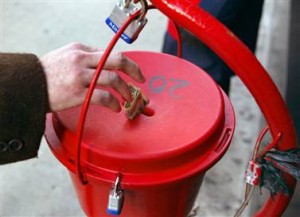Contributed by Sylvia Alloway, Granda Hills, CA
Warm-up Question
Do you have everything you need? If not, what do you think is lacking? Are all needs physical? List some non-physical needs.
Salvation Army the Victim of a Hoax
We have all seen the familiar red pot and patient bell ringer in front of stores at Christmas. Collectors for the Salvation Army receive gifts ranging from a few coins to hundreds of dollars. Forty per cent of the aid association’s capital comes from the humble red Christmas pots.This year, however, the Army’s Charleston, S. C. chapter was the victim of a baffling hoax. A seeming act of great generosity turned into a great disappointment as a check for $25,000 bounced after the group had already spent part of it on the needs of some 100 families.
 Other charitable organizations in the Charleston area received large checks, supposedly from Force Protection, Inc., a manufacturer of armored trucks, but only the Salvation Army cashed theirs. Force Protection knew nothing about the “gifts,” which were drawn on a bank account closed months before. The case is being investigated, but no arrests have been made.
Other charitable organizations in the Charleston area received large checks, supposedly from Force Protection, Inc., a manufacturer of armored trucks, but only the Salvation Army cashed theirs. Force Protection knew nothing about the “gifts,” which were drawn on a bank account closed months before. The case is being investigated, but no arrests have been made.
The loss means a lack of funds that will translate into less help for the poor, even as the recession brings more and people to the door of the nationally known charity.
Source: Associated press article from Yahoo.com
http://news.yahoo.com/s/ap/us_fake_checks_charities
Discussion Questions
- What motive could someone have for giving bad checks to a charity?
- If you came face to face with the person who committed this fraud, what would you say to him/her?
- Some believe that fewer and fewer people care about doing right simply because it is right. Do you agree? If lying, cheating and stealing are on the rise, what, if anything, can the church and/or individual Christians do to stop this trend?
Scripture Texts (NRSV) for Sunday, January 17, 2010 (Second Sunday after Epiphany)
(Text links are to Oremus Bible Browser. Oremus Bible Browser is not affiliated with or supported by the Evangelical Lutheran Church in America. You can find the calendar of readings for Year C at Lectionary Readings.)
For lectionary humor and insight, check the weekly comic Agnus Day.
Gospel Meditation
So there was the wedding party and all of a sudden they ran out of wine. What’s the big deal? Couldn’t they drink something else? No, they could not. Wedding parties of the day were huge, week-long affairs to which the entire community was invited. By the rules of hospitality, the host was expected to provide generously for his guests. Not to do so was a social error so great that it could ruin a family’s reputation.
Many people interpret this story to mean that Jesus approves of marriage and he most certainly does. Others say it proves that God has nothing against good times, which is emphatically true, as well.
But Jesus is also responding to a serious social need. And look how he responds. The “master of the banquet” (similar to what we call the “best man”) is so impressed with the wine that he takes the groom aside to comment on it. “You have saved the best until now.” Jesus can turn the plain and ordinary into his best. In this way he reveals his glory!
The world can only give us bounced checks – IOUs for happiness and contentment which can never truly fulfill our needs. Depend on worldly glitter and gadgets for lasting satisfaction and you will come away empty every time. But Jesus’ presence can turn the “water” of our lives—broken promises, dead-end ambitions, and foolish desires—into his celebratory wine. From Him flow new promises, ambitions, and desires, which lead to inner peace and joy that are not dependent on outward circumstances.
And since we receive both physical and spiritual blessings from God, does it not make sense to share them? Many in our own neighborhoods are physically hungry. Even more suffer from spiritual want. Like the Salvation Army, let us continually give both physical comfort and the message of the Gospel to those in need.
Discussion Questions
- Think about the benefits of knowing and serving Jesus as our Savior. List and talk about some of them.
- What does it mean to be in need? Compare what we think we need to what we really need. Discuss the needs you mentioned in the warm-up question. How do we satisfy these needs?
- In a time when more and more people are without even the basics of life, the Salvation Army and other charitable organizations are stretched to the limit as to how many they can help. What can your church, your Sunday school class, and you personally do to help the poor of your community?
Activities
- Plan a project for your church or youth group that will help the poor of your community. Some examples: You might sponsor a food or clothing drive (especially focusing on clothes for children, babies, or adults going on job interviews). Cook and serve a monthly evening meal in the church hall. Offer babysitting service for the children of parents who are searching for work. Try to make it something that will bring you face to face with those in need.
- Plan a project that will fulfill spiritual needs. Some examples: Go door to door telling people about your church and/or passing out Bibles. Read or act out Bible stories for children. Sponsor a youth concert with Christian music.
Suggested songs: Great Is Thy Faithfulness, Give Thanks (with a Grateful Heart)
Closing Prayer
Merciful Father, who supplies our needs with your best, turn our hearts outward. Open our eyes to the needs of those around us and, out of the help, love, and encouragement that you have first given us, help us to give generously to all. In the name of your Son, Jesus Christ Our Lord, we pray. Amen.

 This was the scene a few weeks ago, until Teka met Veronica at the shelter. Veronica was moving into her own apartment soon. She invited Teka to help her move, in exchange for food and baby clothes. Teka agreed, her hope renewed by the chance to provide for her unborn child. When they arrived at the apartment, things took a turn for the worst. Veronica locked the door and tied Teka’s hands behind her back. She came at Teka with a knife, saying, “You’re strong, you can handle what I’m going to do to you.” Veronica then cut into Teka’s abdomen in an attempt to remove the baby. A few months earlier, Veronica had lied to her friends and family, telling them that she was pregnant. She was trying to remove Teka’s baby and take it as her own.
This was the scene a few weeks ago, until Teka met Veronica at the shelter. Veronica was moving into her own apartment soon. She invited Teka to help her move, in exchange for food and baby clothes. Teka agreed, her hope renewed by the chance to provide for her unborn child. When they arrived at the apartment, things took a turn for the worst. Veronica locked the door and tied Teka’s hands behind her back. She came at Teka with a knife, saying, “You’re strong, you can handle what I’m going to do to you.” Veronica then cut into Teka’s abdomen in an attempt to remove the baby. A few months earlier, Veronica had lied to her friends and family, telling them that she was pregnant. She was trying to remove Teka’s baby and take it as her own.  Representative Henry Brown, Jr. (R-South Carolina), has introduced a bill in the House which, if passed, would make it clear that Congress “strongly disapproves of attempts to ban references to Christmas” and “expresses support for the use of… symbols and traditions by those who celebrate Christmas.” Brown believes that it is important for him to have “the right to celebrate Christmas” and that “wishing someone ‘Merry Christmas’ should never be met with disapproval.”
Representative Henry Brown, Jr. (R-South Carolina), has introduced a bill in the House which, if passed, would make it clear that Congress “strongly disapproves of attempts to ban references to Christmas” and “expresses support for the use of… symbols and traditions by those who celebrate Christmas.” Brown believes that it is important for him to have “the right to celebrate Christmas” and that “wishing someone ‘Merry Christmas’ should never be met with disapproval.” A warming climate is having adverse effects on the Eskimo village of Shishmaref, Alaska. As the ice melts gradually earlier in the spring and forms later in the fall, the coast is beginning to erode—and the houses built along it are in danger of falling into the sea. One house has succumbed to the erosion already and thirteen more have been moved inland to protect them from meeting the same fate. Only one house remains—that of Shelton and Clara Koreok, only feet from the edge. Shelton refuses to move, no matter what the danger, because he fears that moving would mean losing everything he knows.
A warming climate is having adverse effects on the Eskimo village of Shishmaref, Alaska. As the ice melts gradually earlier in the spring and forms later in the fall, the coast is beginning to erode—and the houses built along it are in danger of falling into the sea. One house has succumbed to the erosion already and thirteen more have been moved inland to protect them from meeting the same fate. Only one house remains—that of Shelton and Clara Koreok, only feet from the edge. Shelton refuses to move, no matter what the danger, because he fears that moving would mean losing everything he knows.